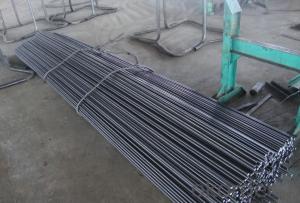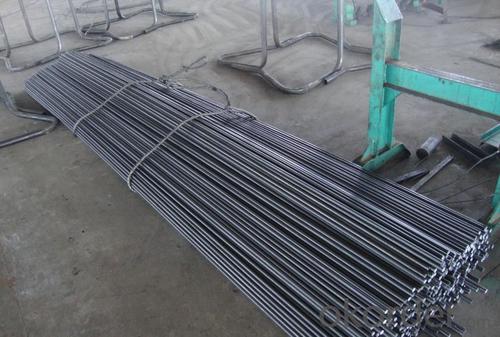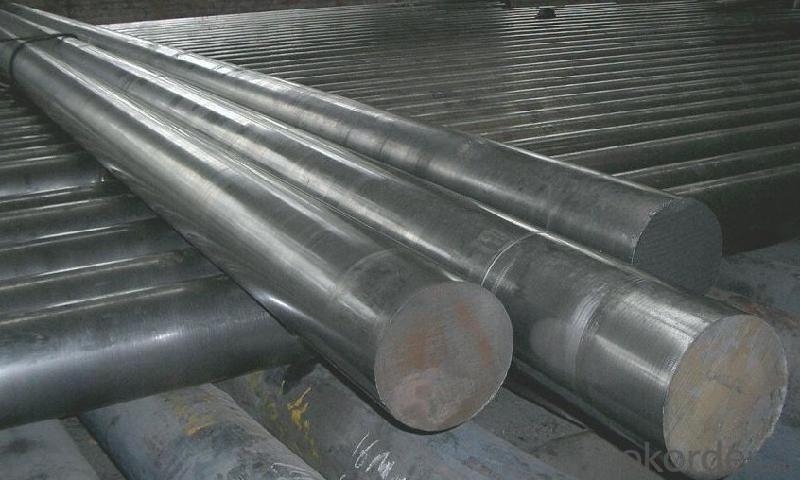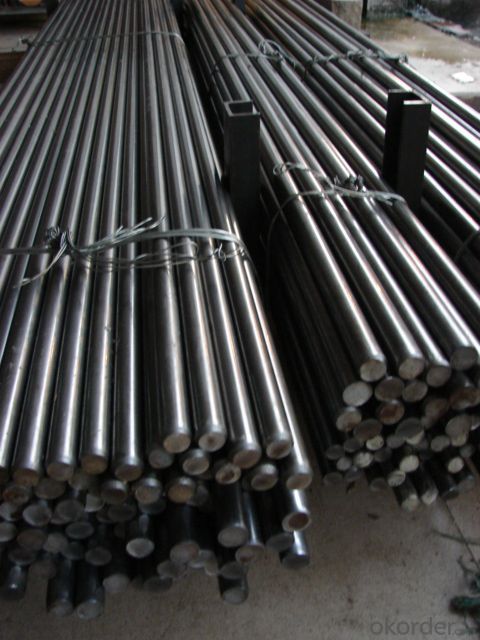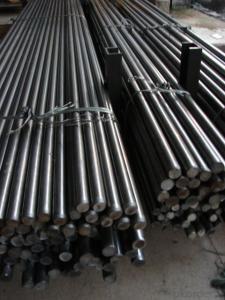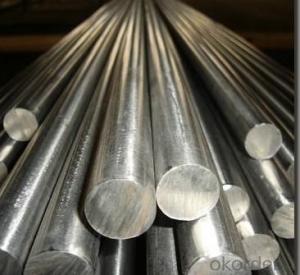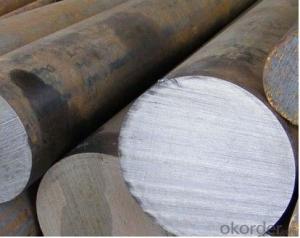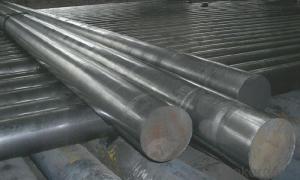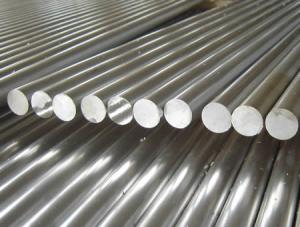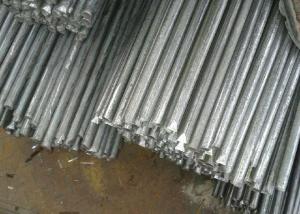Steel Round Bar Cold Drawn with High Qaulity for Construction
- Loading Port:
- China main port
- Payment Terms:
- TT or LC
- Min Order Qty:
- 25 m.t.
- Supply Capability:
- 50000 m.t./month
OKorder Service Pledge
OKorder Financial Service
You Might Also Like
Product Description:
OKorder is offering Steel Round Bar Cold Drawn with High Qaulity for Construction at great prices with worldwide shipping. Our supplier is a world-class manufacturer of steel, with our products utilized the world over. OKorder annually supplies products to European, North American and Asian markets. We provide quotations within 24 hours of receiving an inquiry and guarantee competitive prices.
Product Applications:
Steel Round Bar Cold Drawn with High Qaulity for Construction are ideal for structural applications and are widely used in the construction of buildings and bridges, and the manufacturing, petrochemical, and transportation industries.
Product Advantages:
OKorder's Steel Round Bar Cold Drawn with High Qaulity for Construction are durable, strong, and resist corrosion.
Main Product Features:
· Premium quality
· Prompt delivery & seaworthy packing (30 days after receiving deposit)
· Corrosion resistance
· Can be recycled and reused
· Mill test certification
· Professional Service
· Competitive pricing
Packaging & Delivery of Steel Round Bar Cold Drawn with High Qaulity for Construction:
Packaging Detail: products are packed in bundle and then shipped by container or bulk vessel, deformed bar is usually naked strapping delivery, when storing, please pay attention to moisture proof. The performance of rust will produce adverse effect.
Each bundle weight: 2-3MT, or as required
Payment term: TT or L/C
Delivery Detail: within 45 days after received advanced payment or LC.
Label: to be specified by customer, generally, each bundle has 1-2 labels
Trade terms: FOB, CFR, CIF
FAQ:
Q1: Why buy Materials & Equipment from OKorder.com?
A1: All products offered byOKorder.com are carefully selected from China's most reliable manufacturing enterprises. Through its ISO certifications, OKorder.com adheres to the highest standards and a commitment to supply chain safety and customer satisfaction.
Q2: What makes stainless steel stainless?
A2: Stainless steel must contain at least 10.5 % chromium. It is this element that reacts with the oxygen in the air to form a complex chrome-oxide surface layer that is invisible but strong enough to prevent further oxygen from "staining" (rusting) the surface. Higher levels of chromium and the addition of other alloying elements such as nickel and molybdenum enhance this surface layer and improve the corrosion resistance of the stainless material.
Q3: Can stainless steel rust?
A3: Stainless does not "rust" as you think of regular steel rusting with a red oxide on the surface that flakes off. If you see red rust it is probably due to some iron particles that have contaminated the surface of the stainless steel and it is these iron particles that are rusting. Look at the source of the rusting and see if you can remove it from the surface.
Images:
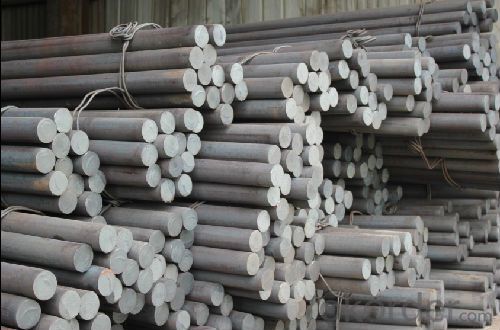
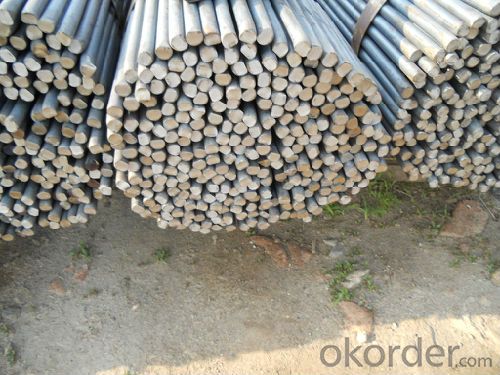
- Q: Can steel round bars be used for structural purposes?
- Indeed, steel round bars have the capability to serve structural purposes. Due to their robustness and endurance, round bars are frequently employed in construction and engineering ventures. These bars function as weight-bearing elements in edifices, bridges, and other structures, offering essential support and stability. The availability of steel round bars in diverse grades and dimensions permits adaptability in both design and utilization. Moreover, they can be effortlessly welded, molded, and machined to fulfill precise project necessities, rendering them a favored option for structural applications.
- Q: What are the advantages of using mild steel round bars?
- There are several advantages of using mild steel round bars in various applications. Firstly, mild steel round bars have excellent strength and durability. They are able to withstand high amounts of stress and pressure, making them suitable for use in construction, manufacturing, and engineering projects. The strength of mild steel round bars ensures that they do not easily deform or break under heavy loads, providing a reliable and long-lasting solution. Secondly, mild steel round bars have good weldability. They can be easily joined or attached to other materials through welding, making them versatile in different applications. This allows for easy customization and flexibility in design, as the bars can be shaped and connected to create complex structures or components. Additionally, mild steel round bars have a low carbon content, making them more cost-effective compared to other types of steel. They are readily available and affordable, making them a popular choice in various industries. Moreover, mild steel round bars have good machinability. They can be easily cut, drilled, and shaped using common machining techniques, allowing for easy fabrication and customization. This makes them suitable for a wide range of applications, from construction to automotive components. Lastly, mild steel round bars have good corrosion resistance. While they may not be as corrosion-resistant as stainless steel, they still offer adequate protection against rust and other forms of corrosion. This makes them suitable for outdoor applications or environments with high humidity or exposure to moisture. In summary, the advantages of using mild steel round bars include their excellent strength and durability, good weldability, cost-effectiveness, machinability, and corrosion resistance. These factors make them a reliable and versatile choice for various industrial and construction applications.
- Q: Are steel round bars resistant to chemicals?
- The resistance of steel round bars to chemicals can vary depending on the specific steel type and the chemicals involved. Stainless steel round bars are well-known for their exceptional resistance to a wide range of chemicals, including acids, alkalis, and various organic compounds. This is because stainless steel contains high levels of chromium, which creates a protective oxide layer on the surface, preventing corrosion and chemical attacks. However, not all steel round bars possess the same level of chemical resistance. Carbon steel round bars, for example, are more prone to corrosion and chemical attacks compared to stainless steel. Corrosive chemicals, especially in highly corrosive environments, can affect carbon steel and cause damage. In such cases, it may be necessary to use additional protective measures, such as coatings or treatments, to enhance the chemical resistance. To summarize, stainless steel round bars provide excellent chemical resistance, whereas carbon steel round bars may require extra precautions to prevent chemical corrosion. When assessing the chemical resistance of steel round bars, it is crucial to consider the specific steel type, the type of chemical, and the environmental conditions.
- Q: What is the toughness of a steel round bar?
- The toughness of a steel round bar refers to its ability to resist fracture or deformation under stress. It is a measure of how well the steel can absorb energy and withstand impact without breaking. The toughness of a steel round bar depends on various factors such as the composition of the steel, its microstructure, and any heat treatment it has undergone. Generally, high-strength and alloy steels tend to have higher toughness due to their enhanced mechanical properties. Additionally, factors such as the presence of impurities, grain size, and the presence of any defects or cracks within the material can also affect its toughness. To determine the toughness of a steel round bar, tests such as the Charpy impact test or the Izod test are commonly performed to measure the energy absorbed by the material before it fractures. Overall, the toughness of a steel round bar is an important characteristic to consider when selecting a material for applications where high impact resistance is required, such as in construction, automotive, or aerospace industries.
- Q: Can steel round bars be used for making handrails?
- Indeed, handrails can be crafted using steel round bars. Owing to their robustness and longevity, steel round bars find widespread usage in construction and fabrication. These bars can be effortlessly molded and joined together through welding techniques, resulting in handrails that furnish support and ensure safety for staircases, balconies, and elevated spaces. Furthermore, steel round bars can be adorned with a variety of coatings or treatments, augmenting their resistance to corrosion and enhancing their visual appeal. In summary, steel round bars are a favored option for fabricating handrails due to their durability, adaptability, and capacity to endure rigorous utilization.
- Q: Can steel round bars be used for making decorative items?
- Certainly, decorative items can indeed be created using steel round bars. With their ability to be shaped, bent, and welded, steel round bars offer a wide range of options for designing various decorative patterns. They possess durability and strength, making them suitable for both indoor and outdoor uses. Decorative furniture, sculptures, railings, gates, light fixtures, and many other items can be crafted from steel round bars. Their sleek and contemporary appearance adds an industrial and modern touch to any space. Furthermore, steel round bars can be finished with different coatings or treatments, such as powder coating or patina, to enhance their visual appeal and protect against corrosion. Consequently, steel round bars are an exceptional choice for creating decorative items because of their versatility, strength, and ability to infuse a stylish and distinctive element into any design.
- Q: Can steel round bars be used for making pipelines?
- Yes, steel round bars can be used for making pipelines. Steel is a widely used material for pipelines due to its strength, durability, and resistance to corrosion. Round bars, which are cylindrical in shape, can be easily fabricated and welded together to form pipelines of various sizes and lengths. The steel round bars used for pipelines are typically made from carbon steel or alloy steel, which have high tensile strength and can withstand high pressure and temperature conditions. Additionally, steel round bars can be coated with protective layers such as epoxy or polyethylene to further enhance their resistance to corrosion. Overall, steel round bars provide a reliable and efficient option for constructing pipelines in various industries such as oil and gas, water supply, and construction.
- Q: Can steel round bars be used in the construction equipment industry?
- Yes, steel round bars are commonly used in the construction equipment industry. Steel round bars are known for their strength, durability, and versatility, making them suitable for various applications in construction equipment. They can be used to manufacture components such as axles, shafts, pins, and fasteners. The high strength of steel round bars ensures that the construction equipment can withstand heavy loads and harsh working conditions. Additionally, steel round bars can be easily machined and welded, allowing manufacturers to create complex and customized designs for construction equipment. Overall, steel round bars are widely utilized in the construction equipment industry due to their exceptional mechanical properties and ability to enhance the performance and longevity of the equipment.
- Q: Can steel round bars be used in automotive applications?
- Indeed, automotive applications do make use of steel round bars. The strength, durability, and versatility of steel round bars make them a popular choice for various automotive components and systems. These bars find their way into the manufacturing of engine parts, suspension components, drive shafts, axles, and other structural parts of vehicles. Their mechanical properties, including high tensile strength and resistance to impact and fatigue, make them well-suited for enduring the demanding conditions encountered in automotive applications. Moreover, steel round bars can be machined, welded, and formed into the desired shape with ease, enabling efficient manufacturing processes in the automotive industry.
- Q: How are steel round bars used in the construction of high-rise buildings?
- Steel round bars are commonly used in the construction of high-rise buildings due to their strength, durability, and versatility. These bars are typically made of carbon steel, which has excellent mechanical properties and can withstand high loads and pressures. In the construction of high-rise buildings, steel round bars are primarily used in reinforced concrete structures. They are commonly used as reinforcement in concrete beams, columns, and slabs. The bars are embedded in the concrete to provide additional strength and stiffness to the overall structure. One of the main advantages of using steel round bars is their ability to resist tension forces. Concrete is strong in compression but weak in tension, so the steel bars act as tension reinforcement, preventing the concrete from cracking or failing under tension loads. This helps to enhance the structural integrity and overall safety of the building. Additionally, steel round bars can be easily bent, shaped, and welded, allowing for flexible design and construction possibilities. They can be customized to specific lengths and diameters to suit the requirements of the building project. This versatility makes them ideal for constructing various structural elements, such as beams and columns, which need to be precisely engineered to support the weight and stresses of a high-rise building. Moreover, steel round bars have excellent resistance to corrosion, which is crucial in the construction of high-rise buildings that are exposed to various environmental elements. The corrosion-resistant properties of steel ensure the long-term durability and lifespan of the structure. Overall, steel round bars play a vital role in the construction of high-rise buildings by providing strength, durability, and flexibility to the reinforced concrete structures. They enhance the overall structural integrity, safety, and longevity of the building, making them an essential component in modern construction practices.
Send your message to us
Steel Round Bar Cold Drawn with High Qaulity for Construction
- Loading Port:
- China main port
- Payment Terms:
- TT or LC
- Min Order Qty:
- 25 m.t.
- Supply Capability:
- 50000 m.t./month
OKorder Service Pledge
OKorder Financial Service
Similar products
Hot products
Hot Searches
